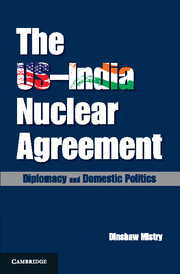

Kruck, Andreas and Zangl, Bernhard 2019. Trading privileges for support: the strategic co-optation of emerging powers into international institutions. International Theory, Vol. 11, Issue. 3, p. 318.
Barthwal-Datta, Monika 2021. Constructing India as a Similar Enough Other: The Bush Administration's Strategic Narrative of the US-India Civil Nuclear Cooperation Agreement. Journal of Global Security Studies, Vol. 6, Issue. 1,
Frankenbach, Patrick Kruck, Andreas and Zangl, Bernhard 2021. India’s recognition as a nuclear power: A case of strategic cooptation. Contemporary Security Policy, Vol. 42, Issue. 4, p. 530.
Hall, Ian 2022. Australia and India in the Modi era: An unequal strategic partnership?. International Politics, Vol. 59, Issue. 1, p. 112.
Poggio Teixeira, Carlos Gustavo and Nicolini Gabriel, João Paulo 2022. The Advantages of Applying the Advocacy Coalition Framework to the Studies On Ethnic Interest Groups. Foreign Policy Analysis, Vol. 18, Issue. 2,
Hall, Ian 2022. From Asia-Pacific to Indo-Pacific. p. 143. Jain, Rajendra K. 2023. India and Europe in a Changing World. p. 327. Singh, Manasi 2023. India and Europe in a Changing World. p. 291. Dinshaw Mistry , University of Cincinnati Publisher: Cambridge University Press Online publication date: August 2014 Print publication year: 2014 Online ISBN: 9781139683487 Digital access for individuals (PDF download and/or read online) Added to cart Digital access for individuals (PDF download and/or read online)From 2005 to 2008, the United States and India negotiated a pathbreaking nuclear agreement that recognised India's nuclear status and lifted longstanding embargoes on civilian nuclear cooperation with India. This book offers the most comprehensive account of the diplomacy and domestic politics behind this nuclear agreement. Domestic politics considerably impeded - and may have entirely prevented - US nuclear accommodation with India; when domestic obstacles were overcome, US–India negotiations advanced; and even after negotiations advanced, domestic factors placed conditions on and affected the scope of US–India nuclear cooperation. Such a study provides new insights into this major event in international politics, and it offers a valuable framework for analysing additional US strategic and nuclear dialogues with India and with other countries.
‘Professor Mistry's masterful account of a seminal event in American and Indian policy is unlikely to be surpassed. Based on a careful review of public material and interviews with key participants on both sides, it is methodologically well-informed, and will be of enormous value to both the policy makers and academic community.'
Stephen P. Cohen - Senior Fellow, Brookings Institution
‘The US–India nuclear agreement was a seminal event in transforming the relations between the two countries after decades of estrangement and integrating India as a mainstream nuclear power. This study offers the first detailed analysis of the negotiations that led to the agreement. Well-researched and rigorously argued, the book is a must read for all those interested in nuclear issues and Indian foreign policy.'
T. V. Paul - James McGill Professor of International Relations
‘This is an extremely well-researched, carefully documented and deftly argued analysis of the origins of the US–India civilian nuclear agreement … Anyone interested in Indo–US relations, the politics of nuclear proliferation and regional security in South Asia will benefit immensely from a careful perusal of this work. Mistry has done the scholarly and policy communities a yeoman service!'
Sumit Ganguly - Tagore Chair in Indian Cultures and Civilizations, and Director, Center on American and Global Security, Indiana University, Bloomington
‘By focusing attention on domestic politics and international security concerns in both Washington and New Delhi, Dinshaw Mistry has produced the first thorough and compelling analysis of the US–India Nuclear Agreement. This is an important book!'
Scott D. Sagan - Senior Fellow, Center for International Security and Cooperation, Stanford University